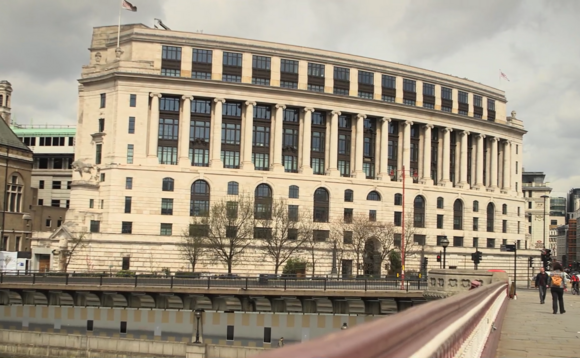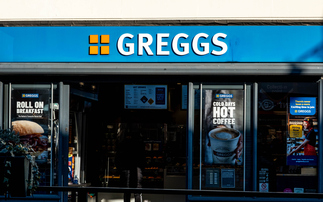Unilever's headquarters in London | Credit: Unilever
Planet Tracker warns consumer goods giant currently falling short of aligning with 1.5C warming pathway
Unilever is currently on course to miss its 2030 climate goals, as its climate transition strategy currently falls far short of what is required for the firm to align with a climate science-aligned 1.5C global warming trajectory, an independent assessment published today claims.
The consumer goods giant - which has long had a reputation as a corporate sustainability leader - has committed to halving its Scope 3 value chain emissions by 2030, in addition to fully decarbonising its core operations by the same date. Meeting the ambitious targets would align the company with a 1.5C global warming trajectory, as recommended by the Science-Based Targets initiative (SBTi).
However, analysis by Planet Tracker claims measures and investment set out in Unilever's existing climate strategy are not enough to deliver on those 1.5C-aligned goals, and based on current plans it is instead on course for higher global warming trajectory of 2C.
The consumer goods giant has long sought to position itself as a leader in corporate sustainability, and in recent years has set targets to fully decarbonise its own operations by 2030, before achieving net zero emissions across its value chain by 2039, all backed by a €1bn Climate and Nature Fund to support its environmental efforts.
To date, the company claims to have reduced its operational Scopes 1 and 2 emissions by 68 per cent since 2015, adding that it is on track to achieve its interim milestone of a 70 per cent cut in emissions by 2025.
But as it stands, Planet Tracker estimates Unilever is set to miss its 2030 goals by around 45 per cent, a shortfall roughly equivalent to the annual emissions of Estonia. It said the projected shortfall is largely due to a lack of detailed measures and investments in support of decarbonising the company's sprawling value chain.
As a result Unilever faces financial risk of between $1.8bn-$3.8bn in the next decade alone from external policy drivers such as tightening land use regulation, rising carbon taxes, and rising energy prices, the think tank estimates.
That would represent more than a third - 38 per cent - of the company's current three-year average annual operating profit, Planet Tracker warned, adding that risks from physical climate-driven impacts could further account for close to another six per cent.
Moreover, the think tank found little linkage between the company's greenhouse gas emission (GHG) mitigation efforts and its promised $1.2bn investment to support these ambitions.
Ion Visinovschi, research analyst at Planet Tracker, said Unilever's climate transition plan was "commendable", but that it lacked the requisite detail that would allow investors and other stakeholders to determine whether the proposed measures would be enough to meet its goals.
"Unilever has put forward a commendable climate transition plan aimed at reducing its broad environmental impact," he said. "However, without a disclosed link between investment, mitigation actions per scope, and expected mitigated GHG emissions amount - even presented as a range - we cannot determine whether Unilever's proposed strategy will lead to the achievement of its goal.
"Investors should demand a higher level of disclosures connecting actions with investment and expected mitigation outcomes, in order to ensure the company's targets have the potential of being reached."
In order to bridge the current gap and achieve its emissions reduction targets, the analysis calculates Unilever needs to reduce its collective Scope 1, 2, and 3 emissions by 16 per cent by 2025 and 34 per cent by 2030, both from a 2022 baseline.
In particular, Planet Tracker claimed the firm would need to reduce its Scope 3 value chain emissions alone by more than a third by the end of the decade in order to align with a 1.5C warming scenario, as set out in the Paris Agreement.
However, the company is currently failing to make up the shortfall in required emissions cuts, the think tank contends.
The report argues that while Unilever's process of identifying risks and opportunities is robust, quantifiable metrics for mitigating or managing these identified risks and opportunities are rarely provided "and when they are, only as isolated case studies".
The analysis is the latest undertaken by Planet Tracker on the climate strategies of a host of leading global consumer goods brands, including The Coca-Cola Company, PepsiCo, and Nestle, the latter of which was similarly accused of failing to provide key details through its climate plan.
Unilever was one of the first major companies to secure SBTi-validated climate goals back in 2017, but as these were aligned with a 2C warming pathway, the firm is now in the process of upgrading these goals to align with a 1.5C trajectory, and is hoping to secure fresh SBTi validation before its next AGM.
Responding to Planet Tracker's analysis, Unilever said it was making "good progress" towards both its operational and value chain science-based emissions goals for the end of the decade.
It also emphasised that its Climate Transition Action Plan had won the backing of 99 per cent of its shareholder votes at its 2021 AGM, and that the firm continues to report annually on progress against the plan in its annual report and accounts, in order to ensure transparency.
However, in a statement, it conceded that "as the climate crisis worsens, it's clear we all need to raise our ambition".
"The next iteration of our climate plan is being developed this year and will be submitted for an advisory vote at our AGM in 2024," Unilever said in a statement.
"In common with other FMCG companies, our biggest challenge is our Scope 3 emissions as they lie outside our direct control. It's essential we work with others to lower these emissions in line with the Paris Agreement. That's why we are taking concrete steps with our most impactful suppliers to help them measure, report, and reduce the carbon footprint of the materials they sell to us."
Want to understand what is going on at the cutting edge of sustainability? Check out BusinessGreen Intelligence - the premier information for professionals focused on the UK's green economy.









